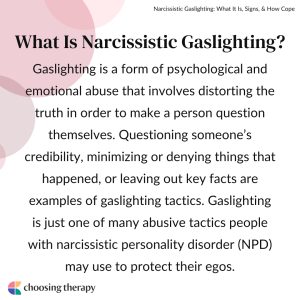- Allocation of Parental Responsibilities: This includes decision-making authority (e.g., education, healthcare, religion, extracurricular activities) and parenting time schedules.
- Best Interests of the Child: The evaluator focuses on factors outlined in 750 ILCS 5/602.5 (for decision-making) and 750 ILCS 5/602.7 (for parenting time), such as the child’s adjustment to home and community, the parents’ ability to cooperate, any history of abuse or neglect, and the child’s preferences (if age-appropriate).
Articles Posted in Clinical Issues in Divorce
DuPage Divorce Attorney: What is Narcissistic Gaslighting?

-
Power and Control: Narcissists thrive on dominance. By gaslighting, they undermine their spouse’s confidence, making them question their decisions, such as pursuing the divorce or asserting their rights. This can weaken the spouse’s resolve and give the narcissist leverage in negotiations or court proceedings.
-
Deflecting Blame: Narcissists rarely accept fault. Gaslighting allows them to rewrite events, portraying themselves as the victim or denying their abusive behavior. For example, they might claim their spouse’s accusations of infidelity or emotional abuse are exaggerated or imagined, shifting focus from their actions.
Illinois Divorce: The Early Bates Case: Parental Alienation
It’s always interesting to read the famous Illinois Supreme Court case of In re Marriage of Bates, 212 Ill. 2d 489. As a younger lawyer I was an attorney on this case, and later was subpoenaed by the trial counsel to testify in the case as an expert knowledgeable in the field of Parental Alienation studies. This case is a landmark case in the area of Parental Alienation, as Illinois recognized Parental Alienation as a factor in a child custody decision.
—-Comments from the Court—-
“E, as proponent of the PAS testimony, proffered three expert witnesses and 136 articles from peer-reviewed publications as exhibits.
Illinois Divorce: Parental Alienation Study Group

Parental Alienation Study Group, Inc (PASG), is a nonprofit international organization of mental health professionals, legal professionals, targeted parents and grandparents, and child and family advocates who are interested in the study of parental alienation.
| Michael | Roe | mroelaw@gmail.com |
Other (Explain in bio below)
|
Legal Professional
|
Saint Charles
|
|
|||||
Illinois Divorce: “It’s All Your Fault”: High Conflict People
Years ago, I helped write and edit elements of Bill Eddy’s landmark book Splitting that offered readers, for the first time, guidance and understanding of personality disorders in the context of a high conflict divorce. Today, Bill continues to educate and help other navigate the difficulties of parenting and divorcing with a HCP (high conflict person).
“In this episode, Megan Hunter dives into the world of high conflict personalities. Megan takes the opportunity to answer listener questions and provide valuable insights on identifying and dealing with individuals who exhibit high conflict behaviors. Throughout the episode, she offers practical strategies for managing these challenging interactions and maintaining your own well-being. Understanding the Five Types of High Conflict Personalities Megan begins by explaining the five high conflict personality types: those who fear feeling inferior, abandoned, ignored, dominated, and paranoid. She emphasizes that while each type has unique traits, they all share a common pattern of behavior driven by fear. By understanding these underlying fears, listeners can develop more effective approaches to communicating and setting boundaries with high conflict individuals. Navigating Family Dynamics with High Conflict Personalities One listener asks for guidance on dealing with a high conflict family member who acts as an “emotional bully.”
https://youtu.be/NQ03AdVB-uY?si=5bIaoM1v0ujVfaA1
Illinois Divorce: Parental Alienation Study Group
PASG Conference for Members:September 4-6, 2024 in Oslo, Norway |

Dear Michael Roe: We at Parental Alienation Study Group anxiously await our upcoming world conference in Oslo, Norway. The program looks great and final preparations are being made! We hope to see you in beautiful Oslo during September 4-6, 2024. For PASG members as well as students, the registration fee is 1,000 Norwegian kroner, which is about USD $100. Full conference tickets for everyone else is NOK 3,500. If you are unable to attend in person, Digital Participation (streaming) will cost you NOK 1,500. But, sign up soon! https://www.pasg.no/konferanse-2024 You may also find this link on the PASG website: Thank you, and we hope to see you in Oslo! |
Kane County Divorce: When is it Appropriate for Kids to Meet a Paramour?
Introducing children to a new romantic partner, or “paramour,” during or after a divorce is a delicate matter that should be approached with careful consideration and sensitivity to the children’s needs and emotions. Here are some factors to consider when determining the appropriate timing for such introductions:
- Stability and Adjustment: It’s generally recommended to wait until the divorce process has reached a point where the children have had time to adjust to the changes in their family dynamics and establish a sense of stability. Rushing into introductions too soon can add additional stress and emotional harm for children still grappling with the divorce.
- Seriousness of the Relationship: Introducing children to a new partner should be reserved for relationships that are serious and highly likely to endure. Children can be deeply harmed by the comings and goings of romantic partners, so it’s important to be very mindful about the emotional impact of introducing them to someone who may not turn out to be a long-term presence in their lives.
DuPage Divorce Lawyer: Toxic Narcissists and Divorce
My practice has managed successfully cases dealing with NPD traits for many years. People with toxic narcissistic traits can cause a lot of harm and damage in a marriage and with children. In a divorce, people with toxic narcissistic traits can continue their self-centered toxicity, blaming, gaslighting, and other harmful behaviors. Narcissists can present significant challenges in a marriage, as well as a divorce, due to their characteristic traits which often include:
- Lack of Empathy: Narcissists typically have difficulty understanding or empathizing with their partner’s feelings and perspectives. This can lead to emotionally abusive behaviors.
- Self-Centeredness: Narcissists tend to prioritize their own needs, desires, and achievements above those of their partner and children. This self-centeredness can lead to a one-sided relationship dynamic where the narcissist’s needs are consistently prioritized over their spouse’s, sometimes to the point of abuse.
Parental Alienation Awareness Day is Thursday, April 25
|
 Illinois Divorce Lawyer Blog
Illinois Divorce Lawyer Blog


